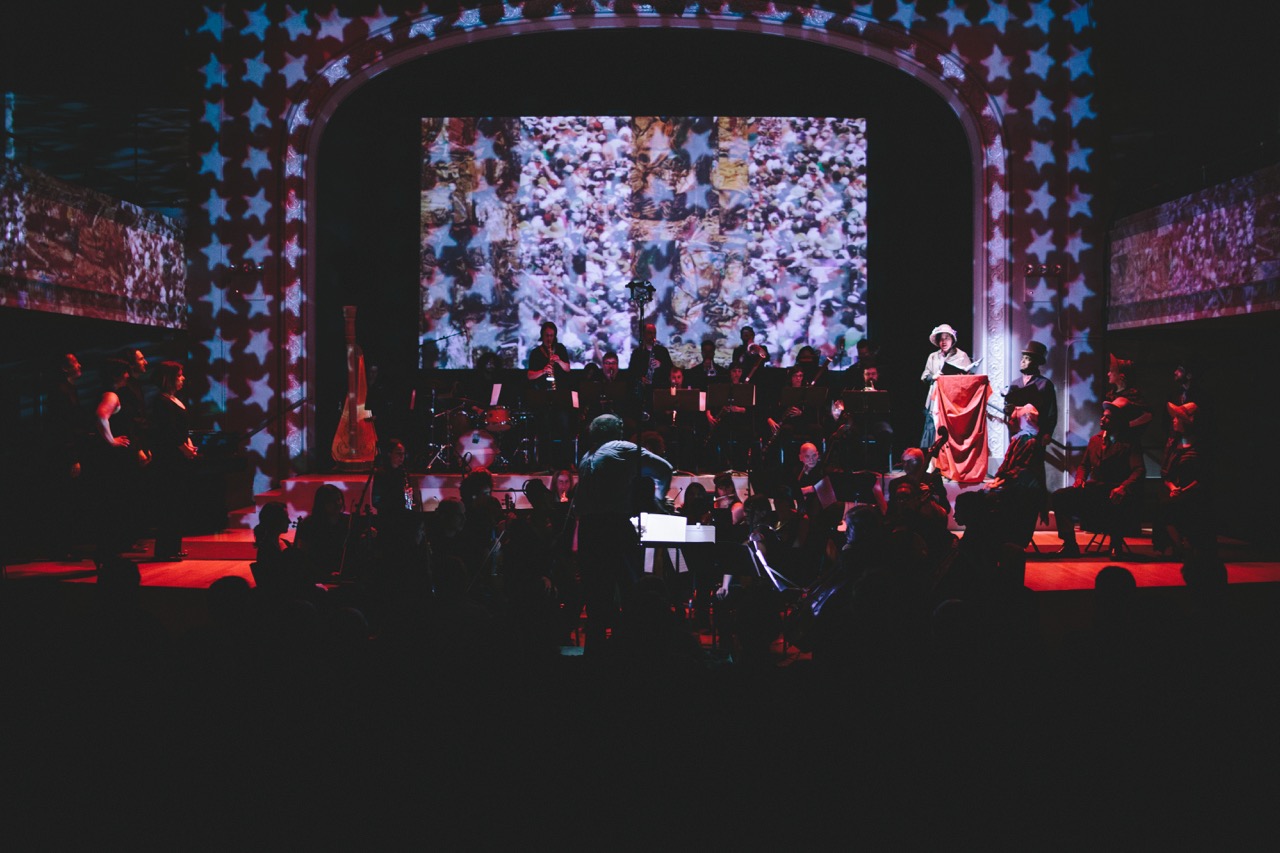1994-1998
The Tri-Centric Foundation was founded in 1994 after Anthony Braxton was awarded a MacArthur Fellowship. Over the next five years, Tri-Centric mounted multiple festivals in New York City (at the Kitchen, the Knitting Factory, and Greenwich House Music School) featuring the music of Braxton and his collaborators; established the original Braxton House Records label and released nine albums; and produced Trillium R: Shala Fears for the Poor, the first fully staged live performance and recording of one of Braxton’s operas.
2010-2013
Recording Braxton's opera Trillium E in March 2010, photo by Michael Weintrob.
After remaining dormant for over a decade, the Tri-Centric Foundation was relaunched with the production of Trillium E: Wallingford’s Polarity Gambit – the first studio recording of a Braxton opera. Over the next few years, Tri-Centric established itself as the hub for activity around Braxton’s music and ideas. It produced multiple festivals, including Tri-Centric Modeling: Past, Present and Future (2010), an all-star event celebrating Anthony Braxton’s 65th Birthday featuring multiple generations of artist influenced by Braxton, which took place at NYC’s Le Poisson Rouge and Issue Project Room; and Energies, Ideas, Intuitions: Tri-Centric Festival (2011), a four-day festival of Braxton works at Roulette in Brooklyn, ranging from solo piano to interdisciplinary dance performance, from interactive electronics to a reading of Trillium J, his latest opera in progress.
Tri-Centric also introduced its website and the record label New Braxton House, giving users access to a vast catalogue of Braxton works previously unavailable to the public. Over the next few years, the Tri-Centric website became the one-stop destination for all things related to Braxton’s music, releasing over fifty New Braxton House albums, forty-one "bootleg" albums, the entire original Braxton House catalog and many scores previously unavailable to the public.
While Tri-Centric was originally formed to support Anthony Braxton’s work, at Braxton’s urging, the organization added another component: supporting the extraordinary community of musicians that had come together around the recent recordings and performances. In 2013, the organization commenced the following initiatives: the Commissioning Series, offering emerging composers the chance to write for creative orchestra; and the Presenting Series, offering artists a high-visibility platform to present new projects under their own leadership. Commissioned artists have included Michael Attias, Daniel Blake, Taylor Ho Bynum, Joseph Daley, Jason Kao Hwang, Ingrid Laubrock, Nicole Mitchell, Jessica Pavone, Kamala Sankaram, and Mark Taylor. Presented artists have included James Fei, Chris Jonas, Steve Lehman, Fay Victor, Andre Vida, and Nate Wooley.
2014-2017
Trillium J performance in 2014, photo by Dylan McLaughlin.
Tri-Centric’s next era began with Anthony Braxton receiving a Doris Duke Artist Award to support his ongoing creative work, and his retirement from teaching, leaving Wesleyan University after 28 years in academia. Following these developments, Tri-Centric produced the two-week Tri-Centric Music Festival (2014) at Roulette, which culminated in a three-day staged world premiere of Braxton’s opera Trillium J: The Non-Unconfessionables. The opera was also recorded in studio, and released as a four-CD plus live performance Blu-ray box set in 2016.
Over this period, Tri-Centric saw an increase in activities outside of New York. It collaborated on multi-disciplinary educational and performance residencies at University of Alabama (Tuscaloosa) and Wake Forest University in North Carolina. It also pursued international partnerships – presenting Braxton’s massive Sonic Genome project (featuring over 60 musicians performing for eight straight hours) in collaboration with the Torino Jazz Festival and Egyptian Museum (Italy), and co-producing a week-long festival in collaboration with the Doek musicians’ collective in Amsterdam (Netherlands).
Tri-Centric continues its support of musicians in its community, offering Research & Development Micro-Grants, providing seed funding for new projects. The first cohort of grant recipients included Andrew Raffo Dewar, Tomas Fujiwara, Kyoko Kitamura, Tomeka Reid, Stephanie Richards, and Katherine Young.
The organization has worked to respond to the increasing interest in Braxton’s music worldwide. In partnership with the online music journal Sound American, it co-produced an issue dedicated Braxton’s work, offering a comprehensive guide to his most recent musical systems. Tri-Centric has also responded to the increasing number of musicians and ensembles interested in performing the music, directly or indirectly facilitating performances by providing scores, repertoire consultations, and performance practice workshops as well as offering connections to conductors and performers experienced in the work. Recent performance partners include the BBC Scottish Symphony Orchestra, Music Fabrik, ICE, the Wet Ink Ensemble, the Either/Or Ensemble, the Jack String Quartet, and many others. Recent educational partners include New England Conservatory, University of California Irvine and San Diego, Dartmouth College, and Harvard University, and youth music organizations like the Kaufman Center's Face the Music and Arts for Art's Visionary Youth Orchestra.
2018-present
In the coming years, the Tri-Centric Foundation will continue to directly support performances and recordings of Anthony Braxton’s working ensembles performing his newest music. This includes Braxton’s ZIM Music Ensemble - a group ranging from six to nine musicians including the composer/leader on saxophones, with the unusual instrumentation including two harps, brass, cello, and accordion; and the Tri-Centric Vocal Ensemble, a twelve voice choir performing Braxton’s Syntactical Ghost Trance Music. Both ensembles recently recorded major multi-album box sets that will be released in the near future.
Anthony Braxton now dedicates most of his time and compositional energy to completing his massive Trillium Cycle – ultimately, an interlinked ‘opera complex’ of 36 acts, a hugely ambitious creative endeavor comparable in scope to Wagner’s Ring Cycle or Stockhausen’s Licht, of which five installments totaling fifteen acts have been performed or recorded since 1985. The organization continues to work with the composer towards the production and recording of Trillium X, the most recently completed four-act chapter of this epic vision.


